Product Description
Creating empowered work teams—a method of involving non-management employees in brainstorming, problem solving, and decision making within an organization—has proven successful in the manufacturing sector and is now being applied to the long-term care field. This practical guide illustrates the far-reaching benefits of empowered work teams in long-term care organizations and explains in everyday terms how to implement the concept.
Embracing the goals of the culture change movement, empowered work teams infuse direct care workers with a sense of efficacy and accountability. These self-directed teams offer input into care practices, facility procedures, and scheduling in ways that improve outcomes for both staff and older adults. This effective management concept can be applied in all long-term care settings, including assisted living facilities, nursing homes, and home health care programs. Staff empowerment offers long-term care administrators multiple advantages, including
- improved quality of care
- increased staff morale
- higher staff retention
- enhanced communication
Based on years of research, Empowered Work Teams in Long-Term Care thoroughly describes the rationale behind empowered work teams and the proven positive effects on staff, management, and older adults. The authors present a fully-validated model for introducing the empowered work team concept to direct care staff, gaining support from the administration, and supervising the teamwork process over time. Hands-on tools include assessment forms, staff training materials, and step-by-step implementation guidelines. Guidance and troubleshooting tips are provided in the resources’s final chapter.
Facility and program administrators, directors of nursing, staff supervisors, and team leaders will find this guidebook an invaluable tool for nurturing a more effective and motivated staff and, as a result, an improved care environment.
About the Authors
Contributors
Acknowledgments
Foreword, by Mary Jane Koren
Preface
Part I. Why Create Empowered Work Teams in Long-Term Care?
Chapter 1
What We Know About Empowered Work Teams in Non-Long-Term Care Settings: Lessons Learned
Chapter 2
The Role of Empowered Work Teams in Nursing Homes
Chapter 3
The Potential for Empowered Work Teams in Assisted Living Communities
Mauro Hernandez
Chapter 4
The Potential for Empowered Work Teams in Home Care Settings
Katherina A. Nikzad, Keith A. Anderson, and Joseph E. Gaugler
Part II. Research Findings on the Effects of Empowered Work Teams and Empowerment in Long-Term Care
Chapter 5
The Effects of Empowered Work Teams in the Green House Project
Jude Rabig
Chapter 6
Effects of Empowered Work Teams in Nursing Homes
Chapter 7
Effects of Empowerment on Direct Care Worker Performance, Attitudes, and Turnover
Chapter 8
Knowledge as Empowerment: Improving Direct Care Workers’ Education and Training
Linda S. Noelker, Farida K. Ejaz, and Heather L. Menne
Part III. Implementing Empowered Work Teams in Long-Term Care
Chapter 9
Initial Orientation for Empowered Work Teams
Chapter 10
Training Managers and Nurses for Empowered Work Teams in Long-Term Care
Chapter 11
Training Direct Care Workers for Empowered Work Teams in Long-Term Care
Chapter 12
Maintaining Effective Teams in LTC: What Must Go Right and What Can Go Wrong
Summary and Conclusions
Appendix: Steps for Implementing Empowered Work Teams in Long-Term Care
References and Suggested Readings
Index
Dale Yeatts, Ph.D.
Dale Yeatts, Ph.D., is Professor of Sociology at the University of North Texas. His primary areas of study are empowered work teams, gerontology, the workplace, and nursing homes. Dr. Yeatts has received large grants from the National Science Foundation, Commonwealth Fund, and Texas Advanced Research Program to examine “what works” in the case of self-managed work teams in both manufacturing and long-term care settings. He has published his work in a variety of places including several books (e.g., High Performing Self-Managed Work Teams: A Comparison of Theory to Practice) and academic and professional journals (e.g., The Gerontologist and Journal of Gerontological Nursing).
Cynthia M. Cready, Ph.D.
Cynthia M. Cready, Ph.D., is Associate Professor of Sociology at the University of North Texas. Her research interests include long-term care of elders, family, and racial/ethnic differentiation and inequality. Her articles on these topics have been published in a variety of journals, including The Gerontologist, The Milbank Quarterly, Health Services Research, Journal of Marriage and the Family, Social Science Quarterly, and others.
Linda S. Noelker, Ph.D.
Linda S. Noelker, Ph.D., is the Senior Vice President for Planning and Organizational Resources and the Director of the Katz Policy Institute at the Benjamin Rose Institute. Dr. Noelker received her graduate degrees from Case Western Reserve University where she is an Adjunct Professor of Sociology. She is the former Editor-in-Chief of The Gerontologist, the leading scientific journal in applied aging research, practice and policy. Dr. Noelker holds leadership positions in the American Society on Aging and the Gerontological Society of America, the two major professional societies in the field of aging. She received the 2005 American Society on Aging Award for exemplary contributions to the field of gerontology and the 2005 Distinguished Career in Gerontology Award from the Behavioral and Social Sciences section of the Gerontological Society of America. Throughout her career, she has conducted research on the nature and effects of family care for frail aged, patterns of service use by older adults and their family caregivers, and sources of stress and job satisfaction among direct care workers.

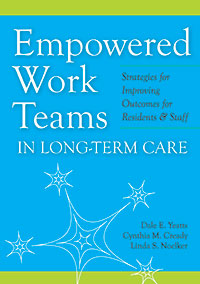
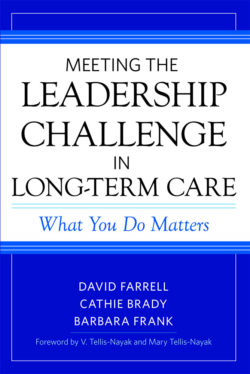

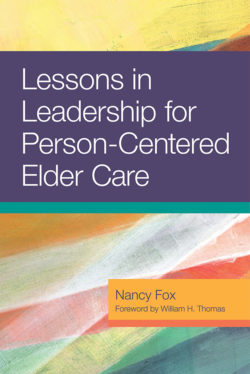
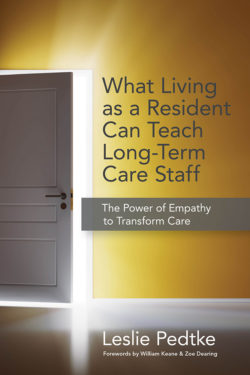

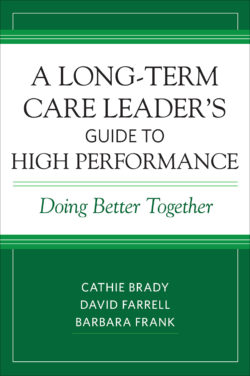
admin –
“Yeatts, Cready, and Noelker provide an excellent new tool for health care leaders as we seek to improve care and services in a challenging and changing environment. Successful organizations can utilize empowered work teams to enhance communication and ultimately impact care delivery.”
–Lisa Melby, LNFA, M.A., Administrator, Good Samaritan Society-Denton Village
admin –
I strongly encourage all long-term care providers to consider implementing empowered work teams in their facilities. Our facility’s certified nursing assistants learned so much and felt so appreciated that their knowledge of the residents’ direct care needs were, indeed, important in the decision-making process. The licensed and management staff also benefited from the empowerment program as it has resulted in a stronger team unity and a sense of accomplishment of each team. …[The authors] have done an outstanding job of documenting and presenting their research and the results of their work.”
–Joan Bellah, Licensed Nursing Facility Administrator, Trinity Terrace CCRC, Fort Worth, Texas
admin –
“Yeatts, Cready, and Noelker provide a very comprehensive review of the theory and research about empowerment within organizations.… Managers or administrators of long-term care facilities will find this volume most relevant to their daily challenges.”
–Stanley R. Ingman, Ph.D., Professor of Applied Gerontology and Director, Applied Gerontology Gerontology Program, University of North Texas